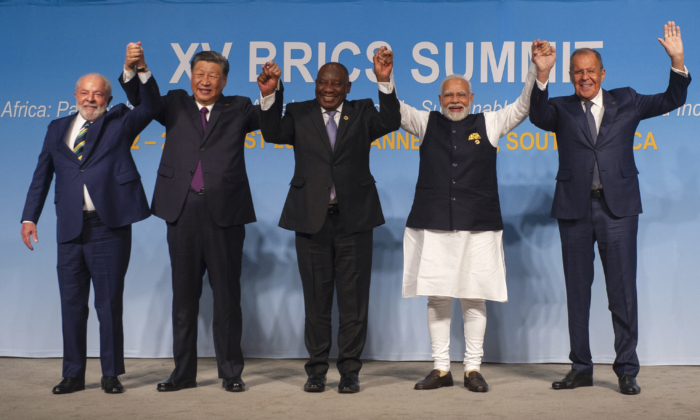


The BRICS economic alliance plans to abandon the U.S. dollar in trade settlements and develop a new reserve currency while promoting the use of local currencies, Brazil's president said at the bloc's 15th annual summit in Johannesburg, South Africa.
Brazilian President Luiz Inacio Lula da Silva championed a medium- to long-term objective of creating a new reserve currency to fight against the U.S. dollar hegemony. Until then, the coalition will encourage the further utilization of members' national currencies in bilateral trade.
"The creation of a currency for commercial transactions and investments between BRICS members increases our payment conditions and reduces our vulnerabilities," Mr. Lula stated before the summit audience, adding that developing nations should be hit with higher interest rates than what affluent countries experience.
The best mechanism, he noted, is to bolster liquidity, increase favorable financing terms, and abolish conditionalities, suggesting that the “structural readjustment” is an indictment of the policies presented by the International Monetary Fund (IMF) and the World Bank.
"The multilateral trading system must be revitalized so that it returns to acting as a tool for fair, predictable, equitable, and non-discriminatory trade," he said.
Brazil's head of state confirmed that a working group to examine a reference currency for BRICS has been launched.
Meanwhile, the organization's New Development Bank (NDB) plans to accelerate its de-dollarization effort by advancing 30 percent of its loans in members' local currencies, such as the South African rand or the Indian rupee, by 2026.
"The good news is that we are seeing many countries choosing to trade using their own currencies. China and Brazil, for instance, are agreeing to exchange with RMB (renminbi) and the Brazilian real," Dilma Rousseff, the former Brazilian president and new head of the so-called BRICS bank, told CGTN in April. “At the NDB, we have committed to it in our strategy. For the period from 2022 to 2026, the NDB has to lend 30 percent in local currencies, so 30 percent of our loan book will be financed in the currencies of our member countries."
This month, the NDB said that it plans to issue the first rupee and rand bond later this year.
South African President Cyril Ramaphosa announced on Aug. 24 that six countries have been officially invited to join the coalition of major emerging countries: Argentina, Egypt, Ethiopia, Iran, Saudi Arabia, and the United Arab Emirates (UAE).
Following an announcement in May, it was officially confirmed during the summit that an expanded "BRICS+" institution would feature other leading emerging markets to bring about equality on both the world stage and within the reformed BRICS.
“BRICS has been borne of a collect desire of counties of the Global South to make the world more just and equitable and to break down the barriers of division," said Namibia President Hage Geingob in prepared remarks. "We don’t want the original BRICS nations to be like the UN Security Council with the 'plus' without veto rights. Since we are starting a new organization, we want equality where small countries can be part of a reformed BRICS.”
Officials assert the purpose behind BRICS expansion is to enhance "development financing" and reform the multilateral trading system to lay the groundwork for "a conducive environment for fair trade."
“This was part of the founding vision of the New Development Bank,” Mr. Ramaphosa said. “The Bank is playing a leading role in efforts to increase the resilience of the Global South, and to bring fairness to global trading and financial systems by strengthening the use of BRICS currencies.”
But while BRICS leaders are confident that this could undermine the Western-led geopolitical power structure and threaten the dollar hegemony, some observers are skeptical that it will achieve anything significant in the short run.
"I think that as great power competition has sharpened," said Michael Kugelman, the director of the South Asia Institute, during an Aug. 24 Wilson Center event. "Washington would have to be watching BRICS with more concern than it had been some years ago."
"I think we don't want to put the cart before the horse here, right? These things move slowly. And we don't know of all of these countries that are expected to join what will come on board," he added.
The future challenge for BRICS is that the coalition will need to foster consensus from 11 members and the countries in the expanded BRICS+ on a broad array of subjects, experts warn.
At the same time, many observers in the West have typically dismissed BRICS as an entity that does not maintain influence on the international stage. But the aim of providing alternatives to Western economic institutions is "gaining momentum amid rapidly intensifying great power competition, particularly between the U.S. and China,” Mr. Kugelman noted.
Regardless of the issues that might spark fierce debate within the bloc moving forward, the expansion will fuel the anti-dollar conversation, ING economists argue.
"News of this faster expansion—especially among the oil exporters—clearly adds some momentum to the de-dollarisation debate," wrote ING economists in a detailed research note.
With the latest expansion, the BRICS' GDP represents 36 percent of the global economy and 47 percent of the world's population. BRICS countries' share of global GDP purchasing power parity (PPP) is slightly more than 32 percent, higher than the G7's 30 percent.


